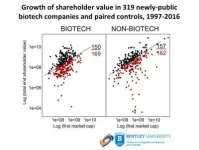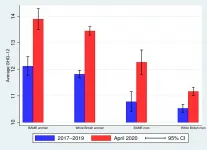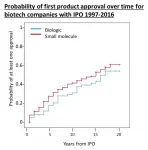Investment risk & return from emerging public biotech companies comparable to non-biotech
Biotech companies with Initial Public Offerings between 1997-2016 generated more than $100 billion in shareholder value despite high failure rate
2021-01-06
(Press-News.org) Investing in biotech companies may not entail higher risk than investing in other sectors, according to a new report from Bentley University's Center for Integration of Science and Industry. A large scale study of biotechnology companies that completed Initial Public Offerings (IPOs) from 1997-2016 demonstrates that these companies produced more than $100 billion in shareholder value and almost $100 billion in new value creation despite a failure rate greater than 50%. The study compared the financial performance and economic value created by these biotech companies to non-biotechnology controls that had similarly timed IPOs.
The findings are published in PLOS ONE in the article "Comparing long-term value creation after biotech and non-biotech IPOs, 1997-2016." Researchers studied the financial performance of 319 biotechnology companies focused on developing therapeutic products that completed IPOs from 1997-2016. These emerging, public biotech companies characteristically had little revenue, high R&D expense, and negative profit (losses) in contrast to non-biotechnology companies, which generated substantial revenue, little or no R&D, and consistent profit after 2001. Despite these differences, the study demonstrates that paired biotech and non-biotech companies had similar rates of success and failure. The analysis shows that 42% of biotechs and 40% of non-biotechs reached $1 billion valuations, while 53% of biotechs and 51% of non-biotechs failed to maintain their IPO market value. Companies also generated similar amounts of shareholder value, though non-biotechnology companies achieved greater net capital creation.
"Despite the extraordinary performance of the biotech sector in recent years, biotech is still often portrayed as a high risk investment. Our study suggests that, in fact, the high-risk, high-return pattern associated with biotech companies after their IPO is a common characteristic of companies completing IPOs from other sectors as well." said Dr. Fred Ledley, Director of the Center for Integration of Science and Industry. "This study also suggests that, for these emerging, public companies, the science-based, biotech business model generates equivalent economic value to more traditional, revenue-based business models."
This study is one part of a large survey of the finances and late stage product portfolios of companies that completed their IPOs over recent decades. These studies show that, while more than 50% of emerging, public biotechnology companies had products that achieved FDA approval, most companies developing products were acquired within several years of their first product approvals, and only four companies achieved revenues of $1 billion by the end of 2016. Thus, despite considerable success in product development and substantial value generation, biotech IPOs from 1997-2016 generated few new large, biopharmaceutical companies.
INFORMATION:
This study was authored by Dr. Ekaterina Galkina Cleary, Dr. Laura M. McNamee, Skyler de Boer, Jeremy Holden, and Liam Fitzgerald along with Dr. Ledley. Ms. De Boer, Mr. Holden, and Mr. Fitzgerald were undergraduate researchers at Bentley University. This work was supported by a grant from the National Biomedical Research Foundation.
THE CENTER FOR INTEGRATION OF SCIENCE AND INDUSTRY at Bentley University focuses on understanding and accelerating the translation of scientific discoveries to create public value. The Center is an environment for thought leadership and interdisciplinary scholarship spanning basic science, data analytics, business and public policy. For more information, visit wwwbentley.edu/sciindustry and follow us on Twitter @sciindustry.
BENTLEY UNIVERSITY is more than just one of the nation's top business schools. It is a lifelong-learning community that creates successful leaders who make business a force for positive change. With a combination of business and the arts and sciences and a flexible, personalized approach to education, Bentley provides students with critical thinking and practical skills that prepare them to lead successful, rewarding careers. Founded in 1917, the university enrolls 4,200 undergraduate and 1,000 graduate and PhD students and is set on 163 acres in Waltham, Massachusetts, 10 miles west of Boston. For more information, visit bentley.edu. Follow us on Twitter @BentleyU #BentleyUResearch.
[Attachments] See images for this press release:

ELSE PRESS RELEASES FROM THIS DATE:
2021-01-06
Our reluctance to think, talk or communicate about death is even more pronounced when we deal with others' loss compared to our own, new research finds, but either way we tend to frame attitudes and emotions in a sad and negative way.
Teaching new more positive ways to address these difficult conversations is the focus of a new paper in PLOS ONE journal by palliative care specialists across Australia.
Led by Flinders University's Research Centre for Palliative Care, Death and Dying (RePaDD) and Palliative and Supportive Services, researchers from Flinders, CQUniversity Australia, NT Palliative Care Central Australia and University of Technology Sydney, surveyed 1,491 people about ...
2021-01-06
Photosynthetic organisms tap light for fuel, but sometimes there's too much of a good thing.
New research from Washington University in St. Louis reveals the core structure of the light-harvesting antenna of cyanobacteria or blue-green algae -- including key features that both collect energy and block excess light absorption. The study, published Jan. 6 in Science Advances, yields insights relevant to future energy applications.
Scientists built a model of the large protein complex called phycobilisome that collects and transmits light energy. Phycobilisomes allow cyanobacteria to take advantage of different wavelengths of light than other photosynthetic ...
2021-01-06
An analysis of 145 scholarly journals found that, among various factors that could contribute to gender bias and lesser representation of women in science, the peer review process itself is unlikely to be the primary cause of publishing inequalities. However, Flaminio Squazzoni and colleagues emphasize that the study does not account for many other factors that may affect women's representation in academia, including educational stereotypes and academic choices of priorities and specialties. Even as female representation has improved in fields such as the humanities, psychology, and the social sciences, a publication gap persists, with male authors continuing to publish more manuscripts in more prestigious journals. To better understand whether ...
2021-01-06
Step into your new, microscopic time machine. Scientists at the University of Colorado Boulder have discovered that a type of single-celled organism living in modern-day oceans may have a lot in common with life forms that existed billions of years ago--and that fundamentally transformed the planet.
The new research, which will appear Jan. 6 in the journal Science Advances, is the latest to probe the lives of what may be nature's hardest working microbes: cyanobacteria.
These single-celled, photosynthetic organisms, also known as "blue-green algae," can be found in almost any large body of water today. But more than 2 billion years ago, they took on an extra important role in the history of life on ...
2021-01-06
In the UK, men from ethnic minorities and women may have experienced worse mental health declines than White British men, according to a study published January 6, 2021 in the open access journal PLOS ONE by Eugenio Proto and Climent Quintana-Domeque of institutions including the University of Glasgow and the University of Exeter, UK.
The COVID-19 pandemic, and the measures enacted to restrict the spread of the virus, have had a major impact on the lives of citizens globally. The authors of the present study examined changes in mental health associated with the pandemic across ethnic groups in the UK.
The researchers used data from the UK Household Longitudinal Study, comparing responses from participants between 2017 and 2019 (i.e.: prior to the pandemic) to responses from ...
2021-01-06
CAR T cells are a breakthrough class of effective but often toxic cancer therapies
To prevent overactivation, switchable CAR T cells were engineered that can be turned on and off with an approved, widely used cancer drug
BOSTON - Scientists at Dana-Farber Cancer Institute and Mass General Cancer Center have created molecular ON-OFF switches to regulate the activity of CAR T cells, a potent form of cell-based immunotherapy that has had dramatic success in treating some advanced cancers, but which pose a significant risk of toxic side effects.
CAR T cells are immune cells genetically modified to recognize and attack tumors ...
2021-01-06
The distribution and concentration of dissolved oxygen and water temperature in the oceans and freshwaters are usually far more influential in shaping the growth and reproduction of fish than the distribution of their prey.
In a new paper in Science Advances, Daniel Pauly, principal investigator of the Sea Around Us initiative at UBC's Institute for the Oceans and Fisheries, argues that scientists need to avoid attaching human attributes to fish and start looking at their unique biology and constraints through a different lens.
This lens is Pauly's own Gill Oxygen Limitation Theory (GOLT), ...
2021-01-06
New York City, January 6, 2021 - CytoDel, Inc. ("CytoDel" or "the Company"), a privately-held corporation, today announces the publication of preclinical data on the Company's lead product, Cyto-111, in the peer-reviewed journal, Science Translational Medicine. The complete text of the article titled, "Neuronal Delivery of Antibodies has Therapeutic Effects in Animal Models of Botulism," can be found here.
Cyto-111 was conceived, expressed and purified in the laboratory of Konstantin Ichtchenko, Ph.D., NYU Grossman School of Medicine, Department of Biochemistry and Molecular Pharmacology, who was a principal investigator in the study, which ...
2021-01-06
A large scale study from Bentley University of the biotechnology companies that completed Initial Public Offerings from 1997-2016 estimates that 78% of these companies are associated with products that reach phase 3 trials and 52% are associated with new product approvals. The article, titled "Late-stage product development and approvals by biotechnology companies after IPO, 1997-2016," shows that these emerging, public biotechnology companies continue to have a role in initiating new product development, but are no longer distinctively focused on novel, biological products.
The new report from the Center for Integration of Science and Industry at Bentley University, published in Clinical Therapeutics, studied the 319 biotechnology ...
2021-01-06
E. coli food poisoning is one of the worst food poisonings, causing bloody diarrhea and kidney damage. But all the carnage might be just an unintended side effect, researchers from UConn Health report in the 27 November issue of Science Immunology. Their findings might lead to more effective treatments for this potentially deadly disease.
Escherichia coli are a diverse group of bacteria that often live in animal guts. Many types of E. coli never make us sick; other varieties can cause traveler's diarrhea. But swallowing even a few cells of the type of E. coli that makes Shiga toxin can make us very, very ill. Shiga toxin damages blood vessels in the intestines, causing bloody diarrhea. If ...
LAST 30 PRESS RELEASES:
[Press-News.org] Investment risk & return from emerging public biotech companies comparable to non-biotech
Biotech companies with Initial Public Offerings between 1997-2016 generated more than $100 billion in shareholder value despite high failure rate



